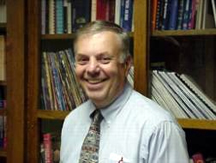
When they graduate from medical school, young doctors are confident in their knowledge of physiology and pharmacology. But when it comes to communicating with patients, some are ill-prepared and awkward.
Dr. Rudolph Navari is out to change that. The associate dean of theCollegeofScienceand director of the Notre Dame Cancer Institute is now the head of The Ruth M. Hillebrand Center for Compassionate Care. Founded last year at Notre Dame, its purpose is to teach communication techniques to improve relationships between health care professionals and patients.
Ironically, bad news delivered by a tactless doctor led to a grant that funded theHillebrandCenter.
Late one night, a specialist phoned Ruth Hillebrand and bluntly told her she had mesothelioma, a rare form of cancer that has no treatment and no cure, and then he hung up. Hillebrand, a clinical psychologist inManhattan, was living alone at the time and had no one to comfort her after this shocking surprise. Before she died in 1994, she asked her brother, Joseph Hillebrand, 43, to set up a trust that would fund a program to teach sensitivity to health professionals.
Navari, who has an oncology practice inSouth Bend, has already earned national recognition for his research on the benefits of encouraging cancer patients to ask their doctors practical questions about their treatment and expected side effects.Some say managed care has forced doctors to limit their communication with patients. I think thats a poor excuse,he says.Patients want their important questions answered. It doesnt need a lot of time.
Now, the grant will help his team advance the other side of the coin: teaching doctors to communicate sensitively with patients.
Factual communication between doctors and patients is important. But the way in which information is delivered is equally important, especially when bad news is involved, Navari says. His program teaches students to deliver bad news in person (not over the phone) and in an appropriate setting such as the doctors office, allowing enough time for patients to absorb the news. Doctors need to prepare patients for a shock such as a cancer diagnosis and should always discuss what can be done about it.
The Hillebrand center is affiliated with theWaltherCancerResearchCenterand will be housed in the newSouth BendCenterfor Medical Education, scheduled to open later this year at the southeast corner of Notre Dame and Angela avenues. TheSouth BendCenteris a joint project of the Indiana University School of Medicine and Notre Dame.
The new medical building will have special facilities where medical students and residents will practice techniques using real patients and some actor patients trained to simulate certain medical conditions. The teaching experience is already under way with medical students from I.U. and theUniversityofChicago. Navari expects further expansion for the program, which he says is a significant benefit for Notre Dames premed students and those in other health professions.
Navari is pleased that patient-physician interaction skills are gaining in importance. In fact, last year the National Board of Medical Examiners established proficiency in oral communication skills as a requirement for medical school graduation.
Such requirements are long overdue, Navari believes.
TopicID: 10828